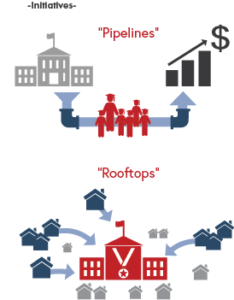WHA’s Education & Workforce Committee advocate for policies and partnerships that provide high-quality educational infrastructure and educational opportunities to achieve a prosperous and sustainable business community and workforce.
Greater West Houston must continue to create and maintain high-quality educational infrastructure and programs to provide an educated workforce needed to maintain and grow the local economy. The area must also address how to sustain and expand educational quality in our region to ensure that families desire to live in West Houston. Most families in Greater West Houston have access to quality primary education, yet four-year college degrees appear increasingly unaffordable and unattainable.
Goal
These school districts and others must maintain very high standards to continue to drive residential and job growth in Greater West Houston. Greater West Houston should maintain and extend its educational advantage. Its primary and secondary educational institutions should compete on a national and international stage.

Amid state budget challenges, educational institutions at all levels struggle to adapt to shifting budgets and curriculum demands. The quality of primary and secondary education available in West Houston varies widely. Struggling school districts not only limit educational opportunities for families but also limit opportunities to develop high-quality housing and the broader economy.
Investment for the Future. Improving these “Pipelines” and “Rooftops” initiatives are among the best ways to promote Quality Growth. Few public investments provide greater returns for the community as high-quality educational infrastructure. New educational infrastructure must be built to serve Greater West Houston’s future growth. The chance to create iconic, focused campuses that are connected to the community will make a lasting, positive impact on our region. Schools built within Master Planned Communities (MPCs) provide exceptional settings and connectivity, and schools outside of MPCs must be built or improved to match. Public support of primary and secondary education is essential to maintaining nationally and internationally competitive educational programs. The University of Houston—Katy Campus and the Houston Community College (HCC) West Houston Institute will provide local, high quality Pipelines, focusing on skills that are sure to contribute to the success of Greater West Houston and the global economy.
School districts that are struggling are often those that have inadequate tax bases. These districts lack financial resources to build new schools, to maintain existing schools and programs, and to compete for teachers and new technology. Greater West Houston must encourage and promote growth within these school districts to improve their competitiveness while maintaining the other districts’ generally high standards.
Collaboration. School districts should expand dual credit programs and articulation agreements. Early college high schools, like the partnership between Alief ISD and Houston Community College (HCC), provide exceptional educational opportunities that accelerate learning and help improve communities’ expectations of educational excellence. The Houston GPS Program coordinates curriculum so students at seven local community colleges can transfer seamlessly to five local universities, which will put opportunity in reach. Partnerships like those between HCC and the University of Houston allow local graduates to obtain high-quality degrees in fields such as engineering for as little as $20,000. High-quality secondary education will require support from industry and the community. In terms of support, infrastructure, and curriculum, the private sector and community should play an increased role in education in Greater West Houston.
The skills that employers and customers are seeking are rapidly changing and education must quickly evolve to meet those needs. Career readiness and the means and methods used to educate students are changing—learning can occur anywhere and some students, schools, and employers are missing opportunities to try new approaches. Educators and employers are often cautious in adopting new technologies and methodologies that will be critical to ensure that students are ready to work and workers are ready for the future.
Sharing Information & Space. WHA is helping educators and employers work together to improve educational and career programs to provide students and employees with deep knowledge and the ability to continue learning. The best employers are seeking to attract and retain employees who are highly productive, creative, entrepreneurial, and motivated. Working with established educational providers can help these employers identify, motivate, and prepare new and existing employees. Re-educating good employees is often much more efficient for companies than trying to find new ones.
Thinking Ahead. The best education providers are thinking like the best healthcare providers and planning for Greater West Houston’s growing population. They are also looking for ways to collaborate, including sharing facilities. HCC’s West Houston Institute, which is collaborating with Apple on a coding academy and a maker space, will help develop a future IT and manufacturing workforce. Lone Star College’s Westway Park Technology Center supports programs for visual communications, cybersecurity, a CISCO Networking Academy, and other programming and information technology offerings. Facilities must also remain adaptable—the space must accommodate future demands while keeping an inviting aesthetic.


